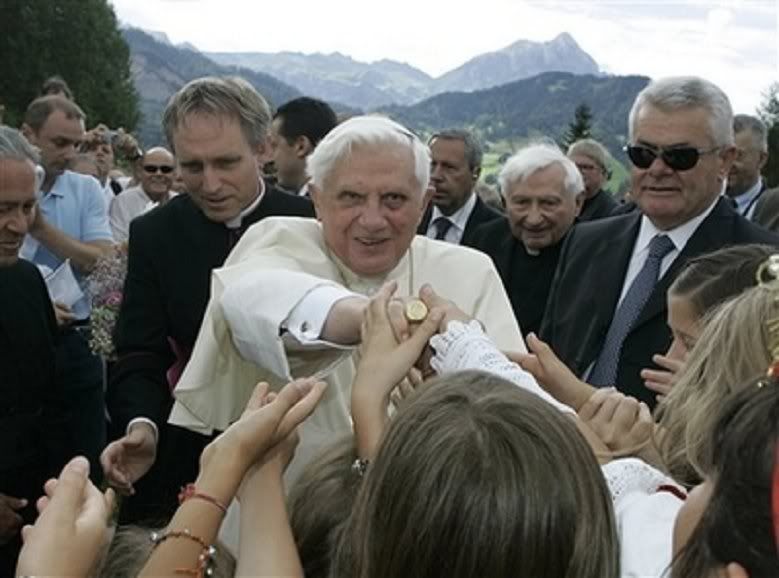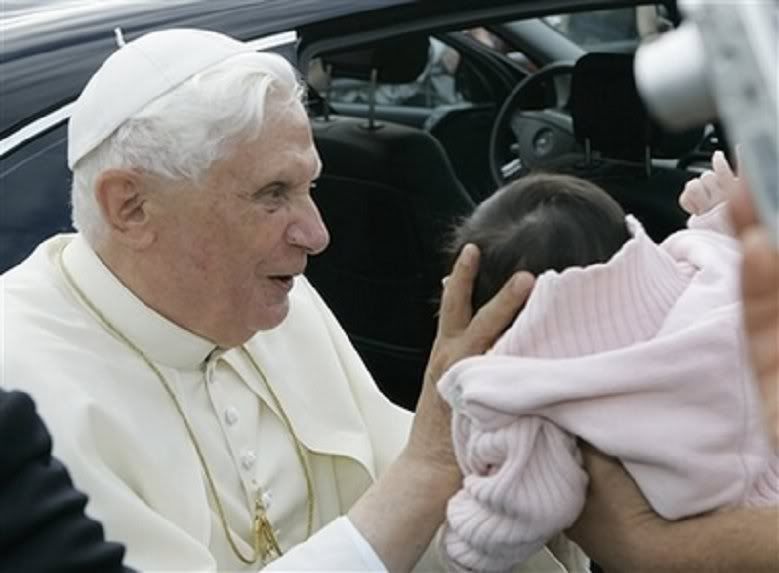
 The Pope while on his vacation went to OLIES Italy. The Ratzinger Forum (Has great pics and stories here incuding this translated piece from an Italian news agency on the Holy Father's Remarks on China.
The Pope while on his vacation went to OLIES Italy. The Ratzinger Forum (Has great pics and stories here incuding this translated piece from an Italian news agency on the Holy Father's Remarks on China.
Joseph Freinademetz was born on April 15, 1852, in Oies, a small hamlet of five houses situated in the Dolomite Alps of northern Italy. The region, known as South Tyrol, was then part of the Austro-Hungarian empire. He was baptised on the day he was born, and he inherited from his family a simple but tenacious faith.
While Joseph was studying theology in the diocesan seminary of Bressanone (Brixen), he began to think seriously of the foreign missions as a way of life. He was ordained a priest on July 25, 1875, and assigned to the community of Saint Martin very near his own home, where he soon won the hearts of the people. However, the call to missionary service did not go away. Just two years after ordination he contacted Fr. Arnold Janssen, the founder of a mission house which quickly developed into the Society of the Divine Word (SVD, after its Latin initials).
With his bishop's permission, Joseph entered the mission house in Steyl, Netherlands, in August 1878. On March 2, 1879, he received his mission cross and departed for China with Fr. John Baptist Anzer, another Divine Word Missionary. Five weeks later they arrived in Hong Kong, where they remained for two years, preparing themselves for the next step.
In 1881 they travelled to their new mission in South Shantung, a province with 12 million inhabitants and only 158 Christians. Those were hard years, marked by long, arduous journeys, assaults by bandits, and the difficult work of forming the first Christian communities. As soon as a community was just barely developed an instruction from the Bishop would arrive, telling him to leave everything and start anew.
Soon Joseph came to appreciate the importance of a committed laity, especially catechists, for first evangelisation. He dedicated much energy to their formation and prepared a catechetical manual in Chinese. At the same time, together with Anzer (who had become bishop) he put great effort into the preparation, spiritual formation and ongoing education of Chinese priests and other missionaries.
His whole life was marked by an effort to become a Chinese among the Chinese, so much so that he wrote to his family: “I love China and the Chinese. I want to die among them and be laid to rest among them.” In 1898, Freinademetz was sick with laryngitis and had the beginnings of tuberculosis as a result of his heavy workload and many other hardships.
So at the insistence of the bishop and the other priests he was sent for a rest to Japan, with the hope that he could regain his health. He returned to China somewhat recuperated, but not fully cured. When the bishop had to travel outside of China in 1907, Freinademetz took on the added burden of the administration of the diocese.
During this time there was a severe outbreak of typhus. Joseph, like a good shepherd, offered untiring assistance and visited many communities until he himself became infected. He returned to Taikia, the seat of the diocese, where he died on January 28, 1908. He was buried at the twelfth station on the Way of the Cross, and his grave soon became a pilgrimage site for Christians. Freinademetz learned how to discover the greatness and beauty of Chinese culture and to love deeply the people to whom he had been sent.
He dedicated his life to proclaiming the gospel message of God's love for all peoples, and to embodying this love in the formation of Chinese Christian communities. He animated these communities to open themselves in solidarity with the surrounding inhabitants. And he encouraged many of the Chinese Christians to be missionaries to their own people as catechists, religious, nuns and priests. His life was an expression of his motto: “The language that all people understand is that of love.”
No comments:
Post a Comment